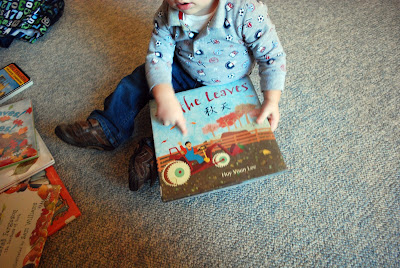Reading is something that we all do daily, but trying to read to and with a toddler is not the reading we are used to doing. Exposure to reading and to books is key for toddlers not the story line or comprehension of the text. At this point, reading might not even include 'reading.' It is very hard for adults to accept that we can open a book, look at pictures and even talk about a book when we do not read the words. Many times I find myself reading Jacob's stories after he walks out of the room just because I want to enjoy the story.
When going to the library weekly, I always have a list of books to look for from our monthly theme list. But I also try to find books that might spark interest in my son. These are books that have pictures that Jake can identify. At this point in his development he is not interesting in listening to stories but rather looking at the pictures and naming the items that he knows. *That does not mean that I do not read the stories to him!
So here are the steps we go through when 'reading' a story:
(These steps can be all at once or over a week, depending on interest, time and length of story.)
1. Have books laying out.
2. Take a book that I choose or that Jake brings to me and look at the cover and point to items that he knows or that might interest him.
3. Open the book and go through the pages only looking at the pictures. Identify items that he knows as well as items that we are focusing on for the month. (This is called a Picture Walk)
4. Go back to the beginning of the book and go through again this time first pointing and naming the items then reading the words of the story. This process is very SLOW! You might have to even stop and name items several times while you are reading the words.
5. Allow Jake to then hold the book by himself and 'read' it to mom.
Again, this process can be completed all at one sitting or over a week. It also happens more than once.
When going to the library weekly, I always have a list of books to look for from our monthly theme list. But I also try to find books that might spark interest in my son. These are books that have pictures that Jake can identify. At this point in his development he is not interesting in listening to stories but rather looking at the pictures and naming the items that he knows. *That does not mean that I do not read the stories to him!
So here are the steps we go through when 'reading' a story:
(These steps can be all at once or over a week, depending on interest, time and length of story.)
1. Have books laying out.
2. Take a book that I choose or that Jake brings to me and look at the cover and point to items that he knows or that might interest him.
3. Open the book and go through the pages only looking at the pictures. Identify items that he knows as well as items that we are focusing on for the month. (This is called a Picture Walk)
4. Go back to the beginning of the book and go through again this time first pointing and naming the items then reading the words of the story. This process is very SLOW! You might have to even stop and name items several times while you are reading the words.
5. Allow Jake to then hold the book by himself and 'read' it to mom.
(He is reading to me and pointing at the tractor. Although he cannot say tractor he points and says, "Brrrrrrr"- the sound the tractor makes!)
Again, this process can be completed all at one sitting or over a week. It also happens more than once.
READ, READ, and REREAD!








Great advice!
ReplyDeleteSoooo true. As a Pre-K teacher, it's amazing what kids can do and start to put together themselves. Great info :) Couldn't agree more about how important reading is!!
ReplyDeleteThat's really interesting. I've always struggled to read to my toddler, thinking that the printed story is important. I also get frustrated when I can't finish a story. I love the idea of taking a picture walk through the book. I can see this being much more successful, interesting and relevant for my little one. She usually gets fixated with a picture in the book anyway. I'm sure we will be picture walking later. Do you think it's important to stick to a theme with the books you use?
ReplyDeleteThanks for the comments!
ReplyDeleteClaire- It is not important to always stick to a theme. I go to the library twice a month and pick some books that follow our theme and other books that I think might interest him. The idea of a theme is just to reinforce what we have been learning, practice vocabulary and to see the same items in different settings. The most important thing is that your little one is picking up the books and looking through them. So whatever gets them to do that will work! It makes it easy to have a list of theme books when going to the library, otherwise there are so many books where do you start. If there is something that your toddler is interested in, that can be your theme! Great question!